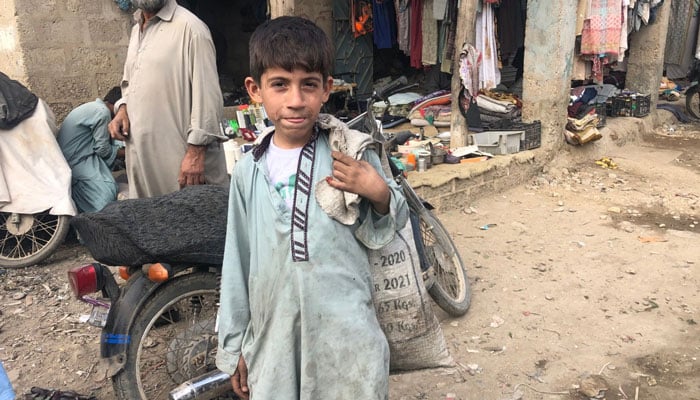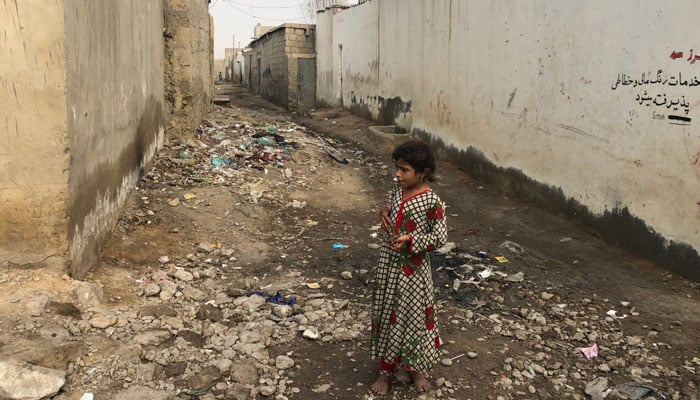Statelessness keeps young Afghan refugees away from education
Akbar Ali, a 12-year-old Afghan refugee in Karachi’s Johenjar Goth, has dreamt of becoming a doctor. But as things stand, he stands no chance of fulfilling that dream.
Without any official identification documents, particularly birth certificates, he can’t even enrol in a primary school. As a result, Ali has been forced to work as a waste picker in the city.
Ali is one among tens of thousands of Afghan refugee children who despite being second- or third-generation refugees born in Pakistan, are deprived of access to education, mainly because of a lack of citizenship cards.
“I don’t know if I can get admission in a school,” said Ali picking rags from the dumps in the Sohrab Goth neighbourhood.
Afghan refugees, including Ali’s parents, have migrated to Pakistan from its western neighbour for decades, first fleeing the Soviet invasion in the 1970s, and then the civil war that ensued.
Since 2001, a fresh influx of refugees followed the US invasion of Afghanistan, and the subsequent Taliban war to take back the country.
With the Taliban regaining control of Kabul in August last year, the number of new refugees seems to be lower than expected so far, according to international aid groups and Pakistani officials.
As of mid-2021, Pakistan ranks fourth in hosting refugee population in the world, with 1.4 million refugees officially registered, according to the United Nations High Commissioner for Refugees (UNHCR).
Besides that, around 880,000 have Afghan citizenship cards, and an estimated 0.3 to 0.4 million undocumented Afghans live within its borders in Pakistan, the UNHCR said.
Shabbir Ahmed, a 48-year-old Afghan refugee, migrated to Karachi from the Kunduz province in 1996, when the Taliban had captured Kabul for the first time and announced their government in most parts of Afghanistan.
Ahmed’s two children were born in Karachi, in 2001 and 2005, but despite being born in the city, they could not get enrolled in a government school.
“Most of the Afghan refugees enrol their children in madrasas because they have no choice,” Ahmed said. “Every school we try to get our children enrolled in asks for the parents’ computerised national identity cards and the child’s Form-B [or child registration certificate that serves as an identity document for those below the age of 18], which refugees can’t obtain.”
Rana Asif Habib, head of the Initiator Human Development Foundation, a Karachi-based NGO that works extensively for Afghan refugees’ children, said that because of statelessness, most of the refugees are compelled to send their children to study in madrasas or ask them to work as waste pickers.
In Pakistan, some 80 per cent of the school-age Afghan refugee population is currently out of school, resulting in extremely low literacy among Afghan refugees, a recent UNHCR report said.
Pakistan itself falls short in meeting the required standard of education at home with the second-highest number of out-of-school children in the world, with an estimated 22.8 million children aged five to 16 not attending school, representing 44 per cent of the total population in this age group, said a recent Unicef report.
“In such a worse situation, particularly after the Taliban takeover in Afghanistan, education for Afghan refugee youths in Pakistan is more important than ever, especially for young girls and others with special needs,” Habib said.
“As is the case anywhere in the world, education is a core human right that provides the foundation for individuals to live sustainable and fulfilling lives.”
Under Pakistan’s constitution, anyone born in the country after 1951 has the right to citizenship. But public sentiment against refugees is so strong that no leader can dare make a move to implement the policy.
The challenge of finding a sustainable solution to the refugee problem is complicated by the fact that Pakistan is not a signatory to the United Nations’ 1951 convention or its 1967 protocol on refugees.
There is no provision in the Pakistani constitution for refugees or displaced populations; there are no laws, specifically protecting refugees, and there is little understanding among government officials, police and judiciary about refugee law. In 2018, soon after coming to power, Prime Minister Imran Khan had vowed to grant citizenship to children of Afghan refugees who have lived in the country for several decades.
Almost four years later, that promise remains unfulfilled because of pressure from various ethnic political parties that fear that allowing refugees citizenship will affect the host communities’ minorities in their provinces.
In Al-Asif Square, a neighbourhood in Karachi’s outskirts where most of the residents are refugees, the Syed Jamaluddin Afghani School offers tuition up to grade 12 for refugees’ children. Since it is registered with the Afghan education ministry, the school’s certification is not recognised by Pakistan.
Syed Mustafa, a teacher at the school, said that around 60 per cent of the refugees’ children residing in Al-Asif Square and the surrounding neighbourhoods don’t attend school.
“Besides the lack of citizenship cards, a lack of enough educational facilities, poverty, as well as indifference on the part of parents are key factors behind it,” Mustafa said.
After completing her 12th grade from the school, Sahiba Bibi, 22, could not fulfil her dream to pursue higher education because of the non-recognition of the school’s certificate and the lack of Pakistani nationality documents.
“If anyone wants to study ahead, he or she will have to go to Afghanistan,” said Sahiba, whose parents had moved from Afghanistan’s Takhar province during the 1980s. “But I was born in Pakistan and haven’t see Afghanistan in my entire life.”
Also, after the takeover of Kabul by the Taliban, the students of the Syed Jamaluddin Afghani School are now facing uncertainty, wondering if the Taliban regime would continue awarding certificates to them, as was the case during the Ashraf Ghani government.
The school was recognised in 1996 by the Rabbani government in exile, and later on by the Taliban regime, and the Hamid Karzai and Ghani governments.
-
 Meghan Markle Shows ‘real Pain’ With Her Body Language In Jordan
Meghan Markle Shows ‘real Pain’ With Her Body Language In Jordan -
 Jennifer Garner Names Her Movie That She Hasn't Seen In Full Since Its Premiere
Jennifer Garner Names Her Movie That She Hasn't Seen In Full Since Its Premiere -
 Bridgerton’s Michelle Mao On Facing Backlash As Season Four Antagonist
Bridgerton’s Michelle Mao On Facing Backlash As Season Four Antagonist -
 King Charles Gets New ‘secret Weapon’ After Andrew Messes Up
King Charles Gets New ‘secret Weapon’ After Andrew Messes Up -
 Shia LaBeouf Makes Bold Claim About Homosexuals In First Interview After Mardi Gras Arrest
Shia LaBeouf Makes Bold Claim About Homosexuals In First Interview After Mardi Gras Arrest -
 Princess Beatrice, Eugenie ‘strained’ As They Are ‘not Turning Back’ On Andrew
Princess Beatrice, Eugenie ‘strained’ As They Are ‘not Turning Back’ On Andrew -
 Benny Blanco Addresses ‘dirty Feet’ Backlash After Podcast Moment Sparks Online Frenzy
Benny Blanco Addresses ‘dirty Feet’ Backlash After Podcast Moment Sparks Online Frenzy -
 Sarah Ferguson Unusual Trait That Confused Royal Expert
Sarah Ferguson Unusual Trait That Confused Royal Expert -
 Prince William, Kate Middleton Left Sarah Ferguson Feeling 'worthless'
Prince William, Kate Middleton Left Sarah Ferguson Feeling 'worthless' -
 Ben Affleck Focused On 'real Prize,' Stability After Jennifer Garner Speaks About Co Parenting Mechanics
Ben Affleck Focused On 'real Prize,' Stability After Jennifer Garner Speaks About Co Parenting Mechanics -
 Luke Grimes Reveals Hilarious Reason His Baby Can't Stop Laughing At Him
Luke Grimes Reveals Hilarious Reason His Baby Can't Stop Laughing At Him -
 Why Kate Middleton, Prince William Opt For ‘show Stopping Style’
Why Kate Middleton, Prince William Opt For ‘show Stopping Style’ -
 Here's Why Leonardo DiCaprio Will Not Attend This Year's 'Actors Award' Despite Major Nomination
Here's Why Leonardo DiCaprio Will Not Attend This Year's 'Actors Award' Despite Major Nomination -
 Ethan Hawke Reflects On Hollywood Success As Fifth Oscar Nomination Arrives
Ethan Hawke Reflects On Hollywood Success As Fifth Oscar Nomination Arrives -
 Tom Cruise Feeling Down In The Dumps Post A Series Of Failed Romances: Report
Tom Cruise Feeling Down In The Dumps Post A Series Of Failed Romances: Report -
 'The Pitt' Producer Reveals Why He Was Nervous For The New Ep Of Season Two
'The Pitt' Producer Reveals Why He Was Nervous For The New Ep Of Season Two





